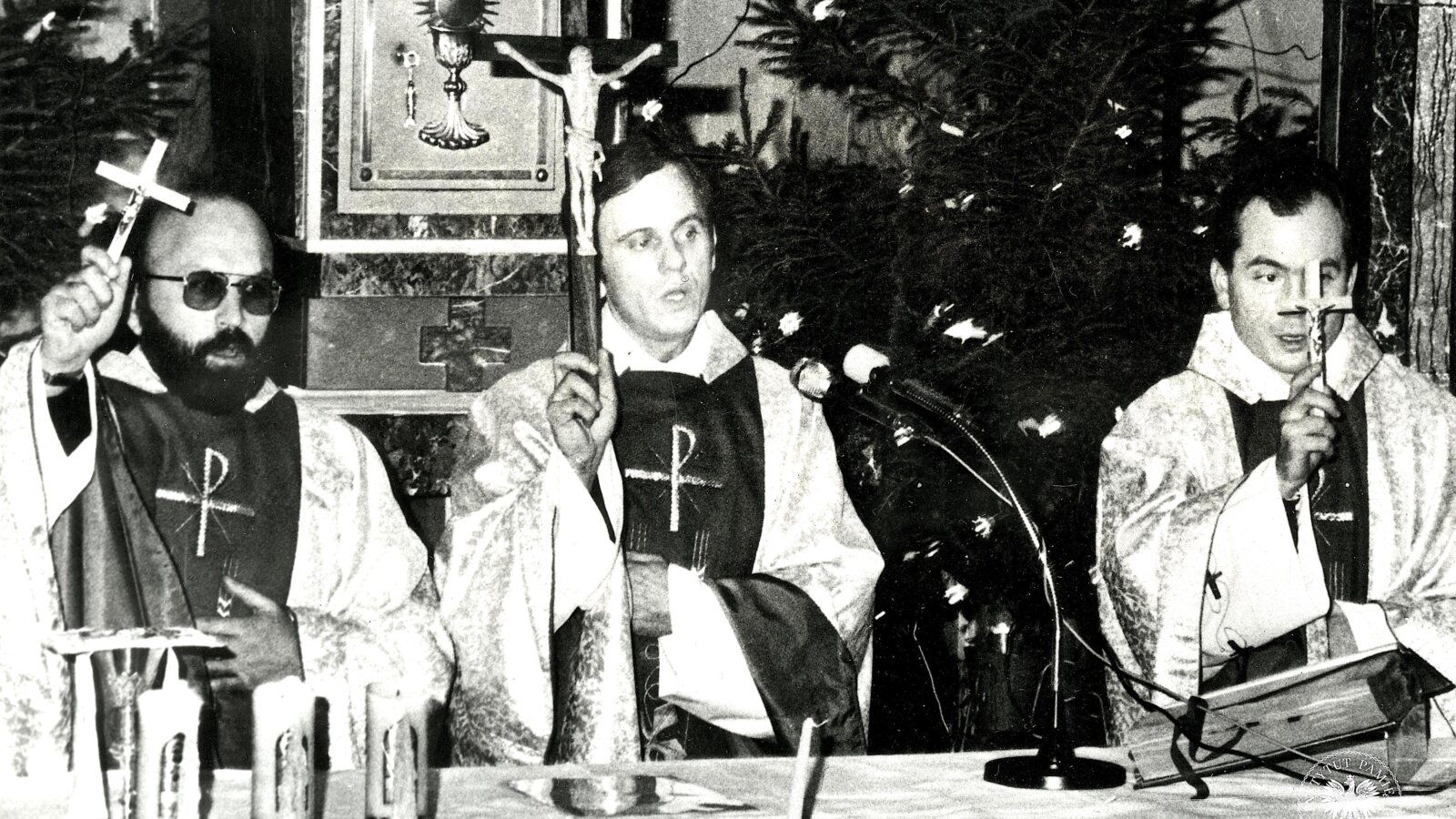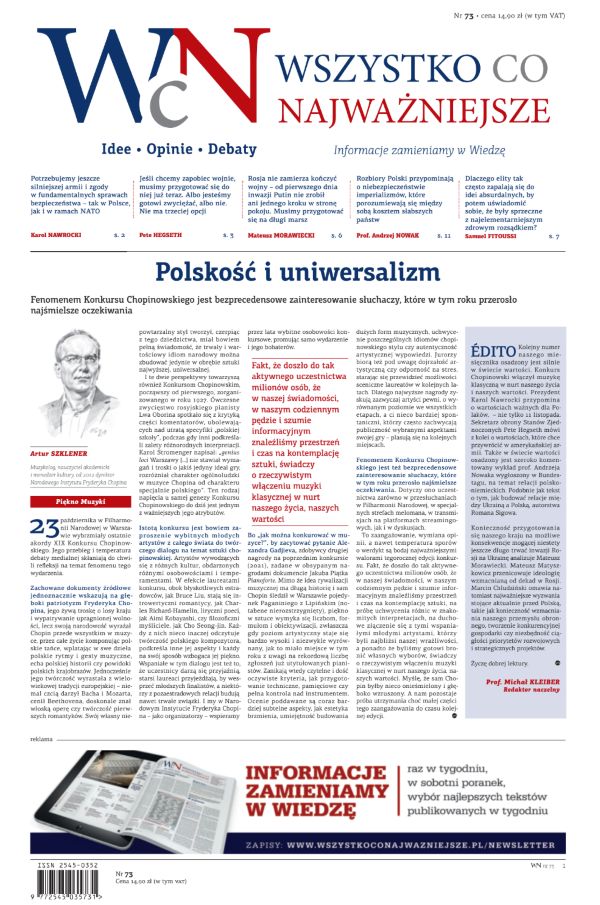
 Conquering evil with good
Conquering evil with good
Forty years ago, my homeland, Poland, was under a communist dictatorship as part of the Eastern Bloc. In October 1984, the state television reported the kidnapping of Father Jerzy Popiełuszko, a charismatic preacher.
.It was mentioned that the Security Service, which was the political police of the Red regime, had acted “on their own account”. The priest’s dead body was discovered shortly after – the experts verified that he had been murdered after being subjected to torture.
This news shocked the Polish society. More than 600,000 people, including delegations of workers from across the country, attended the Warsaw funeral ceremonies for the murdered priest.
Who was the 37-year-old priest from the Warsaw archdiocese whose death had such a profound impact on millions of Poles? Why was he declared blessed by the Catholic Church in 2010?
To understand this, we need to go back in time to the Second World War. On 1 September 1939, the German Third Reich launched an armed attack on the Republic of Poland. Subsequently, under the Molotov-Ribbentrop Pact signed on August 23, Soviet forces entered Poland on September 17, taking control of a considerable part of our eastern lands. The Republic of Poland as a state collapsed, but the Polish Underground State emerged and continued to resist the invaders, working closely with the Allies. From November 1943 to August 1945, during the conferences held in Tehran, Yalta and Potsdam, the leaders of the United States, the United Kingdom and the Soviet Union formulated the foundations of a new European order. In doing this, they sealed the fate of Poland – a country that had been contributing to Western culture for a thousand years and was the first to resist the armed invasion of the Third Reich, never engaging in collaboration with Nazi Germany, and instead providing numerous soldiers to the Allied armies across all fronts.
Unfortunately, the arrangements made by the Big Three meant that my homeland, though formally liberated, remained under Soviet rule. Instead of freedom and progress, the end of the Second World War and the tragic German occupation brought communist enslavement to Poland. With Red Army garrisons permanently stationed on our territory, it effectively became part of the Roman Empire with its capital in Moscow.
The Soviet-dependent communist government and its totalitarian ideology were the antithesis of the ideals and aspirations cherished by Poles, such as a sovereign state, respect for Christian tradition and religious freedom, an economy based on private property and social solidarity or the desire to recover from the regression caused by the destruction wrought by two world wars. Unfortunately, the fears of Polish patriots were confirmed. The consequences of implementing communism in Poland mirrored those observed elsewhere in the world: political and economic exploitation by the USSR, an inefficient economy, widespread impoverishment, work beyond human strength, the privileges of a lazy “red aristocracy”, systemic violations of human rights and national culture, harsh censorship, a police state, show trials, brutal crushing of workers’ protests, murders and other crimes committed with impunity by the repressive apparatus.
Social life in communist Poland was poisoned by phenomena that George Orwell prophetically described in his novel 1984, including newspeak and doublethink, as well as public displays of hatred directed at those stigmatised by the authorities as the “enemies of the people”. Being labelled as an enemy did not require explicitly advocating for the regime’s overthrow or directly criticising its mistakes and malevolence – all one had to do was speak about obvious truths or use concepts such as freedom, justice, human dignity, worker dignity and solidarity according to their original meanings. People could by no means address the evil of the tyranny of fear and opportunism, uphold truth as a value in both individual and collective life, advocate for a Christian vision of society and express love for one’s homeland. Last but not least, remaining calm in the face of pressure and harassment, publicly praying for the persecuted and imprisoned members of the opposition or providing spiritual and moral support to those who were internally free was also more than enough to provoke the authorities’ ire.
Amid these harsh realities, Jerzy Popiełuszko carried out his priestly duties. He served as chaplain to the nationwide Solidarity movement, which emerged during the wave of mass strikes in 1980. Although it was outlawed soon, the group continued its activities in secrecy. For many Poles, Father Jerzy became a true authority and a conscience awakener who embodied the nation’s hunger for freedom. Crowds flocked to his famous masses for the homeland, and his fiery, inspiring sermons spread throughout the country via tape recordings and underground publications. His pastoral work among the working class and the democratic opposition earned him recognition as a spiritual guide and protector fully devoted to his vocation.
In response, the communist regime launched a campaign of slander, provocation and derision. They attempted to intimidate Father Popiełuszko and assaulted him physically. When these efforts failed, the valiant priest was abducted, tortured and brutally murdered by three operatives of a special division of the Security Service tasked with combating the Catholic Church in Poland. To this day, the circumstances of the crime remain uncertain, and doubts persist about the investigation and trial that followed. The perpetrators were released long before the end of their long prison sentences.
From the first days following his death, Father Jerzy Popiełuszko has been revered in Poland as a martyr whose courageous deeds showed his unwavering devotion to the Gospel. Pope Benedict XVI announced that the Solidarity chaplain had died for his faith and for the Christian ideals of truth and love for one’s neighbour. He risked his life to bring religious comfort to those oppressed both as citizens and as Christians.
However, Father Jerzy’s most significant, universal and timeless message was the motto he adopted from St. Paul’s Letter to the Romans: “Conquer evil with good”. The priest persistently advocated against responding to cruelty, violence and inhumane treatment in kind. He cautioned that reciprocating evil would ultimately lead Poles to question the true value of their eventual victory if, in the process of defeating our adversaries, we ended up becoming like them. He chose the path of sacrifice and unwavering commitment to the values he cherished.
.I firmly believe that Father Jerzy Popiełuszko’s life and work, his triumph over the communist system of lies and oppression even after his death and his call to overcome evil with good should inspire profound contemplation for those striving to improve the modern world. The Legacy of Father Jerzy is a powerful reminder to hold onto hope and never give up in the fight for peace and justice.



